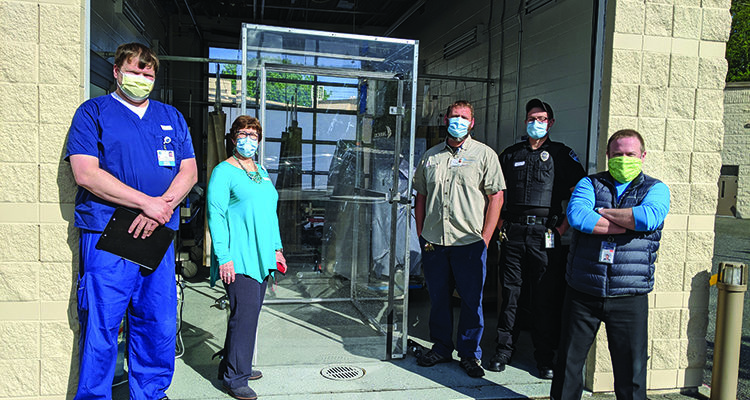In addition, several facilities around the world have made hand sanitizer in their labs for employees to use and to donate to hospitals. As resin suppliers, the plants have enough of the basic chemicals – such as isopropyl alcohol, glycerin and gel – to make small batches for use in their immediate communities.
Hexion’s contributions have helped others, but they also provide a lift for the company’s employees. “It’s been a big morale booster for our associates,” says Knight. “We have people working from home and our plants are running, but this is something they can rally around.”
Fabricating Face Shields
One of the most common PPE items being made by composites companies around the world are face shields. TRB Lightweight Structures in Huntingdon, England, redeployed personnel and machinery that normally create advanced composite components for electric vehicles to produce 1,000 reusable face visors a day. Cincinnati-based A&P Technology Inc. has made more than 15,000 face shields.
“We saw the need in industry to help protect our frontline healthcare workers,” says Molly Dingeldein, marketing manager for A&P Technology. “Our shop and fabrication area can quickly turn around products, so we thought it would be a good thing to do.” Initially, the company made the polycarbonate face shields on its high-capacity milling equipment for family members and friends of employees who work in healthcare. Then, it expanded to provide masks to local hospitals, fire departments and nursing homes. It also partnered with a local organization called May We Help to seek out recipients who need face shields.
While A&P Technology has remained open as an essential business during the coronavirus pandemic, face shield production has helped keep employees busy. “Some of our production has been stopped or suspended in the aerospace area,” says Dingeldein. “Employees in those production cells have been helping with the fabrication of face shields.”
Miles Fiberglass & Composites has also diverted some employees to the production of face shields. “We were successful During the coronavirus pandemic, personal protective equipment is critical for workers in a variety of industries. This employee of a wastewater treatment plant uses a face shield made by Miles Fiberglass & Composites.
“We were successful t receiving a Paycheck Protection Program loan, so we kept our employees [during the pandemic]. But our sales had fallen off a bit, so we had extra labor,” says Miles-Olund. “We decided to use the extra labor to produce shields for material cost only. It was a way we could help out with little retooling.”
The company used open source face shield directions from the University of Wisconsin’s Makerspace to create the disposable shields made from plastic, foam and an elastic strap. Miles Fiberglass & Composites has supplied face shields to a variety of organizations, including a wastewater treatment plant, an ophthalmologist, a medical center in Connecticut and Parrot Creek Ranch, a long-term residential treatment program for adolescent boys. “The community has been so supportive helping us contact organizations and get the word out,” says Miles-Olund.
Making a Difference
As the country grapples with the ongoing pandemic and how to safely return to life’s daily activities, composites companies continue to think of ways they can help. Recently, A&P designed anti-abrasive sneeze guards that companies can place on desks and counters to protect staff and customers from germs. The ¼-inch thick acrylic sneeze guards, which the company branded IgGY Guards in a nod to immunoglobulin G (IgG) antibodies, are available in 46 x 36-inch rectangular sheets or 31 x 44.5-inch curved sheets, as well as custom sizes.
No matter the product, from simple face masks to large isolation booths, employees appreciate being able to contribute during these unprecedented times. “This pandemic has created a lot of stress and uncertainty. People feel powerless and don’t know what they can do about it,” says Bridge. “If you can give employees something tangible, where they can pitch in and help a local hospital or other organization, that helps take some of the stress away. They are making a difference where they can.”
Thank you notes and emails, particularly from frontline healthcare professionals, confirm that composites companies are indeed making a difference. One registered nurse from Good Samaritan Hospital in Cincinnati summed it up in a note to A&P Technology: “I have so much gratitude to your company for deciding that you wanted to help in the battle we healthcare workers are fighting against the pandemic. Your efforts make us feel a little safer and protected.”



